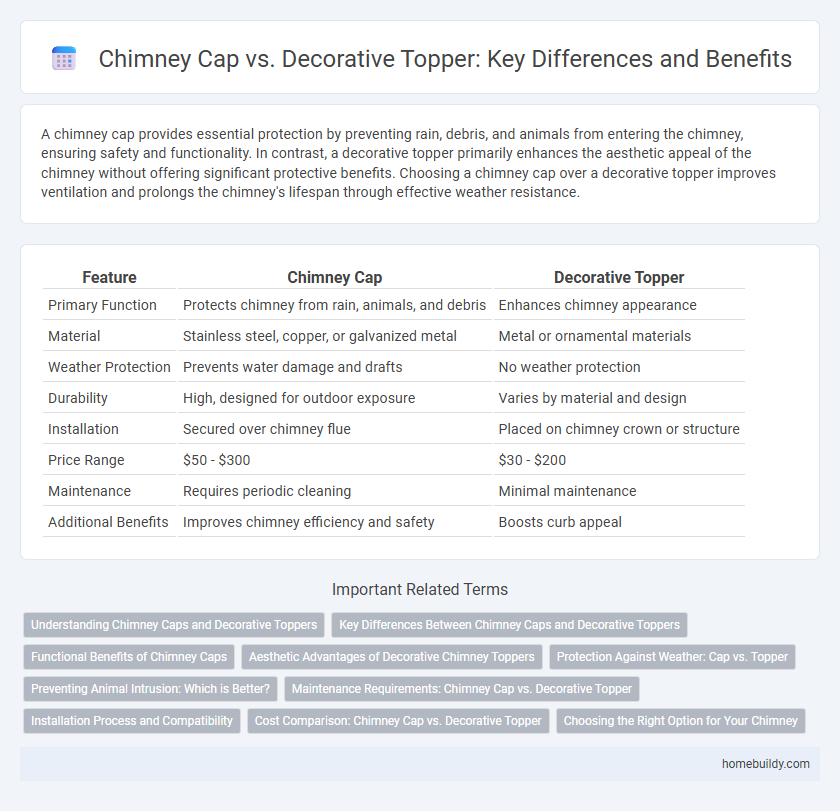A chimney cap provides essential protection by preventing rain, debris, and animals from entering the chimney, ensuring safety and functionality. In contrast, a decorative topper primarily enhances the aesthetic appeal of the chimney without offering significant protective benefits. Choosing a chimney cap over a decorative topper improves ventilation and prolongs the chimney's lifespan through effective weather resistance.
Table of Comparison
| Feature | Chimney Cap | Decorative Topper |
|---|---|---|
| Primary Function | Protects chimney from rain, animals, and debris | Enhances chimney appearance |
| Material | Stainless steel, copper, or galvanized metal | Metal or ornamental materials |
| Weather Protection | Prevents water damage and drafts | No weather protection |
| Durability | High, designed for outdoor exposure | Varies by material and design |
| Installation | Secured over chimney flue | Placed on chimney crown or structure |
| Price Range | $50 - $300 | $30 - $200 |
| Maintenance | Requires periodic cleaning | Minimal maintenance |
| Additional Benefits | Improves chimney efficiency and safety | Boosts curb appeal |
Understanding Chimney Caps and Decorative Toppers
Chimney caps serve a vital functional role by preventing rain, debris, and animals from entering the chimney, ensuring proper ventilation and reducing fire hazards. Decorative toppers primarily enhance the aesthetic appeal of the chimney, often designed to complement architectural styles without providing the protective benefits of a chimney cap. Understanding the distinction between chimney caps and decorative toppers is essential for homeowners seeking effective chimney protection combined with visual enhancement.
Key Differences Between Chimney Caps and Decorative Toppers
Chimney caps are functional components designed to prevent rain, debris, animals, and downdrafts from entering a chimney, often made from durable metals like stainless steel or copper. Decorative toppers primarily enhance the aesthetic appeal of a chimney without providing the protective benefits of caps, focusing on style and design rather than functionality. Key differences include the chimney cap's role in chimney safety and ventilation versus the decorative topper's emphasis on visual enhancement.
Functional Benefits of Chimney Caps
Chimney caps provide essential protection by preventing rain, snow, and debris from entering the chimney, reducing the risk of moisture damage and blockages. Their mesh design also keeps animals and birds out, minimizing fire hazards and nesting issues. Compared to decorative toppers, chimney caps offer superior functionality by enhancing chimney safety and prolonging the lifespan of the chimney structure.
Aesthetic Advantages of Decorative Chimney Toppers
Decorative chimney toppers enhance curb appeal by offering customizable designs that complement various architectural styles, unlike standard chimney caps which prioritize function over form. These toppers often feature intricate details, materials, and colors that transform the chimney into a striking focal point. Homeowners seeking both protection and aesthetic value find decorative toppers provide a unique blend of safety and visual interest.
Protection Against Weather: Cap vs. Topper
A chimney cap provides essential protection against rain, snow, and wind, preventing water damage and moisture buildup inside the chimney flue, which can lead to structural deterioration. In contrast, a decorative topper primarily enhances chimney aesthetics but often lacks the full coverage or sealing features needed to keep out harsh weather elements effectively. For optimal weather protection and chimney longevity, investing in a properly designed chimney cap is crucial.
Preventing Animal Intrusion: Which is Better?
Chimney caps are specifically designed to prevent animal intrusion by featuring mesh screens that block birds, squirrels, and other wildlife from entering the chimney flue. Decorative toppers often prioritize aesthetics over functionality and may lack adequate barriers to effectively keep animals out. For optimal protection against animal intrusion, chimney caps offer a superior balance of ventilation and prevention.
Maintenance Requirements: Chimney Cap vs. Decorative Topper
Chimney caps require regular inspection and cleaning to prevent creosote buildup and ensure proper ventilation, typically needing maintenance every one to two years. Decorative toppers often demand less frequent upkeep but may require occasional repairs or repainting to maintain aesthetic appeal and protect against weather damage. Proper maintenance of chimney caps is crucial for safety and functionality, while decorative toppers primarily focus on preserving appearance.
Installation Process and Compatibility
A chimney cap installation involves securely fitting a protective cover over the chimney flue to prevent debris, rain, and animals from entering, typically requiring precise measurements and durable materials like stainless steel or copper. Decorative toppers, while also installed atop chimneys, prioritize aesthetic enhancement and may have less stringent functional requirements, often using lighter materials and simpler attachment methods compatible with various chimney sizes and styles. Compatibility depends on chimney dimensions and design; chimney caps must match the flue size and shape for proper sealing, whereas decorative toppers offer more flexibility but might not provide the same level of protection.
Cost Comparison: Chimney Cap vs. Decorative Topper
A chimney cap typically costs between $100 and $300, offering essential protection against rain, animals, and debris, while a decorative topper ranges from $50 to $150 but provides mainly aesthetic enhancement. Investing in a chimney cap delivers functional benefits and long-term savings by preventing costly chimney damage, whereas decorative toppers serve primarily to complement architectural style without structural protection. Homeowners prioritizing safety and durability often find chimney caps to be the more cost-effective choice despite the higher initial expense.
Choosing the Right Option for Your Chimney
A chimney cap provides essential protection against rain, debris, and animal intrusion, ensuring the chimney's functionality and safety. Decorative toppers enhance the aesthetic appeal of your chimney but lack the protective features critical to prevent damage and blockages. Selecting the right option depends on prioritizing durability and weatherproofing with a chimney cap while considering decorative toppers primarily for visual impact.
Chimney cap vs Decorative topper Infographic

 homebuildy.com
homebuildy.com